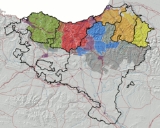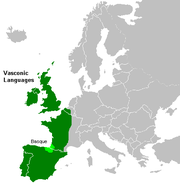
Vasconic languages
Encyclopedia

Language family
A language family is a group of languages related through descent from a common ancestor, called the proto-language of that family. The term 'family' comes from the tree model of language origination in historical linguistics, which makes use of a metaphor comparing languages to people in a...
of Vasconic languages
Vasconic languages
The Vasconic substratum theory is a proposal that many western European languages contain remnants of an old language family of Vasconic languages, of which Basque is the only surviving member. The proposal was made by the German linguist Theo Vennemann, but has been rejected by other linguists...
, of which Basque
Basque language
Basque is the ancestral language of the Basque people, who inhabit the Basque Country, a region spanning an area in northeastern Spain and southwestern France. It is spoken by 25.7% of Basques in all territories...
is the only surviving member. The proposal was made by the German linguist Theo Vennemann
Theo Vennemann
Theo Vennemann is a German linguist known best for his work on historical linguistics, especially for his disputed theories of a Vasconic substratum and an Atlantic superstratum of European languages. He also suggests that the High German consonant shift was already completed in the early 1st...
, but has been rejected by other linguists. According to Vennemann, Vasconic languages were once widespread on the European continent before they were mostly replaced by Indo-European languages
Indo-European languages
The Indo-European languages are a family of several hundred related languages and dialects, including most major current languages of Europe, the Iranian plateau, and South Asia and also historically predominant in Anatolia...
. Relics of these languages include toponyms
Toponymy
Toponymy is the scientific study of place names , their origins, meanings, use and typology. The word "toponymy" is derived from the Greek words tópos and ónoma . Toponymy is itself a branch of onomastics, the study of names of all kinds...
across Central and Western Europe and some vocabulary in Germanic
Germanic languages
The Germanic languages constitute a sub-branch of the Indo-European language family. The common ancestor of all of the languages in this branch is called Proto-Germanic , which was spoken in approximately the mid-1st millennium BC in Iron Age northern Europe...
and Balto-Slavic languages
Balto-Slavic languages
The Balto-Slavic language group traditionally comprises Baltic and Slavic languages, belonging to the Indo-European family of languages. Baltic and Slavic languages share several linguistic traits not found in any other Indo-European branch, which points to the period of common development...
that cannot be traced to a common Indo-European
Indo-European
Indo-European may refer to:* Indo-European languages** Aryan race, a 19th century and early 20th century term for those peoples who are the native speakers of Indo-European languages...
ancestor.
Proposal
Vennemann proposes that after the last Ice AgeWisconsin glaciation
The last glacial period was the most recent glacial period within the current ice age occurring during the last years of the Pleistocene, from approximately 110,000 to 10,000 years ago....
, Vasconic people from today's Basque region of northern Spain and Southern France
Southern France
Southern France , colloquially known as le Midi is defined geographical area consisting of the regions of France that border the Atlantic Ocean south of the Gironde, Spain, the Mediterranean, and Italy...
resettled the Europe
Europe
Europe is, by convention, one of the world's seven continents. Comprising the westernmost peninsula of Eurasia, Europe is generally 'divided' from Asia to its east by the watershed divides of the Ural and Caucasus Mountains, the Ural River, the Caspian and Black Seas, and the waterways connecting...
an continent. They gave names to the rivers and places. These names often persisted after the Vasconic languages were replaced by Indo-European languages. This is based on parallelisms in European hydronymy that have been noted by Hans Krahe
Hans Krahe
Hans Krahe was a German philologist and linguist, specializing over many decades in the Illyrian languages. He was born at Gelsenkirchen....
, and in culture by Marija Gimbutas
Marija Gimbutas
Marija Gimbutas , was a Lithuanian-American archeologist known for her research into the Neolithic and Bronze Age cultures of "Old Europe", a term she introduced. Her works published between 1946 and 1971 introduced new views by combining traditional spadework with linguistics and mythological...
, that are suggested to be relics of a pre-Indo-European
Indo-European substrate hypotheses
The term pre-Indo-European languages relates to several non-classified languages that existed in prehistoric Europe and South Asia before the arrival of bearers of Indo-European languages....
substratum
Substratum
In linguistics, a stratum or strate is a language that influences, or is influenced by another through contact. A substratum is a language which has lower power or prestige than another, while a superstratum is the language that has higher power or prestige. Both substratum and superstratum...
. Theo Vennemann believes that one of the substrata is Vasconic because typical elements of pre-Indo-European toponyms can be explained through the Basque language, for instance the element aran, Unified Basque haran "valley", in names like Val d'Aran
Val d'Aran
The Val d'Aran is a valley in the Pyrenees mountains and a comarca in the northwestern part of the province of Lleida, in Catalonia, northern Spain. Most of the valley constitutes the only part of Spain, and of Catalonia, on the north face of the Pyrenees, hence the only part of Catalonia whose...
, Arundel
Arundel
Arundel is a market town and civil parish in the South Downs of West Sussex in the south of England. It lies south southwest of London, west of Brighton, and east of the county town of Chichester. Other nearby towns include Worthing east southeast, Littlehampton to the south and Bognor Regis to...
, or Arendal
Arendal
is a town and municipality in the county of Aust-Agder, Norway. Arendal belongs to the traditional region of Sørlandet.The town of Arendal is the administrative center the municipality and also of Aust-Agder county...
. However, most linguists believe that the probability of the hydronym
Hydronym
A hydronym is a proper name of a body of water. Hydronymy is the study of hydronyms and of how bodies of water receive their names and how they are transmitted through history...
s to have Indo-European origins is greater.
Another alleged evidence for the Vasconic language is the persistence of vigesimal
Vigesimal
The vigesimal or base 20 numeral system is based on twenty .- Places :...
(base-20 counting) traits in Celtic
Celtic languages
The Celtic languages are descended from Proto-Celtic, or "Common Celtic"; a branch of the greater Indo-European language family...
, French
French language
French is a Romance language spoken as a first language in France, the Romandy region in Switzerland, Wallonia and Brussels in Belgium, Monaco, the regions of Quebec and Acadia in Canada, and by various communities elsewhere. Second-language speakers of French are distributed throughout many parts...
, Georgian
Georgian language
Georgian is the native language of the Georgians and the official language of Georgia, a country in the Caucasus.Georgian is the primary language of about 4 million people in Georgia itself, and of another 500,000 abroad...
, the Resian dialect
Resian dialect
The Resian dialect is a distinct dialect of Slovene spoken in the Resia Valley, Province of Udine, Italy, close to the border with Slovenia...
, and Danish
Danish language
Danish is a North Germanic language spoken by around six million people, principally in the country of Denmark. It is also spoken by 50,000 Germans of Danish ethnicity in the northern parts of Schleswig-Holstein, Germany, where it holds the status of minority language...
. Vennemann thinks that the vigesimal system is a trait of the Vasconic language.
Vennemann also adduces evidence from genetics
Genetics
Genetics , a discipline of biology, is the science of genes, heredity, and variation in living organisms....
and blood type
Blood type
A blood type is a classification of blood based on the presence or absence of inherited antigenic substances on the surface of red blood cells . These antigens may be proteins, carbohydrates, glycoproteins, or glycolipids, depending on the blood group system...
s that show that the Basque
Basque people
The Basques as an ethnic group, primarily inhabit an area traditionally known as the Basque Country , a region that is located around the western end of the Pyrenees on the coast of the Bay of Biscay and straddles parts of north-central Spain and south-western France.The Basques are known in the...
s share characteristics found throughout Central and Western Europe, especially in typical areas of retreat-like mountains.
Vennemann developed his ideas in a series of papers which were collected in a book called Europa Vasconica - Europa Semitica. A long critical review of this appeared in Lingua 116.
The hypothetical Vasconic substratum has been largely rejected by historical linguists. Vennemann's theories on "Vasconic" toponymy
Toponymy
Toponymy is the scientific study of place names , their origins, meanings, use and typology. The word "toponymy" is derived from the Greek words tópos and ónoma . Toponymy is itself a branch of onomastics, the study of names of all kinds...
and hydronymy were opposed by the British linguist P. R. Kitson in 1996. German linguist Dieter Steinbauer argued that a language isolate
Language isolate
A language isolate, in the absolute sense, is a natural language with no demonstrable genealogical relationship with other languages; that is, one that has not been demonstrated to descend from an ancestor common with any other language. They are in effect language families consisting of a single...
like Basque is unfit for the reconstruction of a substratum language, as there is little historical data for Basque and that Basque itself has adopted many words from Indo-European languages. Steinbauer criticized Vennemann for assuming Basque roots with initial consonant clusters (which are commonly believed to be adapted from other languages), for ignoring indications that the ancient Etruscan language
Etruscan language
The Etruscan language was spoken and written by the Etruscan civilization, in what is present-day Italy, in the ancient region of Etruria and in parts of Lombardy, Veneto, and Emilia-Romagna...
seems more closely related to western Anatolian languages
Anatolian languages
The Anatolian languages comprise a group of extinct Indo-European languages that were spoken in Asia Minor, the best attested of them being the Hittite language.-Origins:...
, and for several methodological flaws, stating that "a scientific discourse with Vennemann must face insurmountable obstacles".
See also
- Atlantic (Semitic) languagesAtlantic (semitic) languagesThe Atlantic languages of Semitic or "Semitidic" origin are a disputed concept in historical linguistics put forward by Theo Vennemann...
- Atlantic Bronze AgeAtlantic Bronze AgeThe Atlantic Bronze Age is a cultural complex of the Bronze Age period of approximately 1300–700 BC that includes different cultures in Portugal, Andalusia, Galicia, Armorica and the British Isles.-Trade:...
- Bronze Age in Europe
- UrbianUrbianUrbian or Urian is a possible Old European or Pre-Indo-European language defined by Sorin Paliga. The Proto-Indo-European language, the descendants of which have replaced the Pre-IE language, ought not to include a root corresponding to Latin urbs, as the Proto-IE were nomadic or semi-nomadic...
- Old European hydronymyOld European hydronymyOld European is the term used by Hans Krahe for the language of the oldest reconstructed stratum of European hydronymy in Central and Western Europe...
- Indo-European substrate hypothesesIndo-European substrate hypothesesThe term pre-Indo-European languages relates to several non-classified languages that existed in prehistoric Europe and South Asia before the arrival of bearers of Indo-European languages....
- Pre-Roman peoples of the Iberian PeninsulaPre-Roman peoples of the Iberian PeninsulaThis is a list of the Pre-Roman peoples of the Iberian peninsula .-Non-Indo-European:*Aquitanians**Aquitani**Autrigones - some consider them Celtic .**Caristii - some consider them Celtic ....
- Proto-Basque

